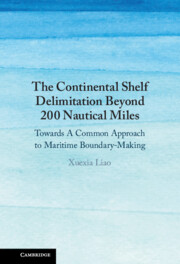 The Continental Shelf Delimitation Beyond 200 Nautical Miles
The Continental Shelf Delimitation Beyond 200 Nautical Miles from Part I - Overlapping Entitlements to the Continental Shelf beyond 200 Nautical Miles
Published online by Cambridge University Press: 08 October 2021
This chapter discusses in detail the establishment of the entitlement to the continental shelf beyond 200 nautical miles under the United Nations Convention on the Law of the Sea. The meaning of natural prolongation, which is historically significant yet nebulous, has been transformed by Article 76, and its interpretation has to be examined in the context of application of Article 76 by coastal States and the Commission on the Limits of the Continental Shelf. The Bangladesh/Myanmar case clarified the meaning of natural prolongation, but its reasoning fell short of giving the notion any effect as a treaty term. In addition, other elements constitutive of the entitlement to the continental shelf beyond 200 nm, including the foot of the continental slope, the outer limits of the continental shelf, and the coasts are analyzed and their role in the process clarified.
To save this book to your Kindle, first ensure no-reply@cambridge.org is added to your Approved Personal Document E-mail List under your Personal Document Settings on the Manage Your Content and Devices page of your Amazon account. Then enter the ‘name’ part of your Kindle email address below. Find out more about saving to your Kindle.
Note you can select to save to either the @free.kindle.com or @kindle.com variations. ‘@free.kindle.com’ emails are free but can only be saved to your device when it is connected to wi-fi. ‘@kindle.com’ emails can be delivered even when you are not connected to wi-fi, but note that service fees apply.
Find out more about the Kindle Personal Document Service.
To save content items to your account, please confirm that you agree to abide by our usage policies. If this is the first time you use this feature, you will be asked to authorise Cambridge Core to connect with your account. Find out more about saving content to Dropbox.
To save content items to your account, please confirm that you agree to abide by our usage policies. If this is the first time you use this feature, you will be asked to authorise Cambridge Core to connect with your account. Find out more about saving content to Google Drive.